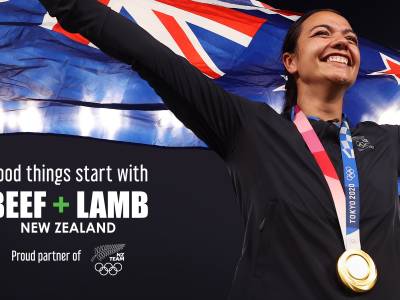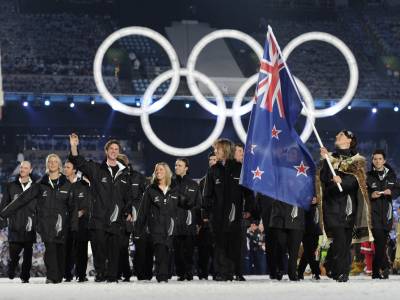FOOTBALL AT THE OLYMPICS
Football is the most popular team sport in the world, with 270 million people actively involved in the sport worldwide – 265 million players and 5 million referees and officials. It has a long history as an Olympic sport since its debut at the Paris Games in 1900.
Qualifying – the road to Tokyo
For the men’s competition sixteen teams qualify from the six regional confederations of FIFA (football’s governing body), with the host nation qualifying automatically. Men's teams are restricted to under-23 players (born on or after 1 January 1997) with a maximum of three overage players allowed. Due to the postponement of Tokyo 2020 by a year, the age restriction has been extended to under-24 players plus three overage players.
Oceania gets one automatic spot, North America (Honduras, Mexico) and South America (Brazil, Argentina) have two each, Africa (Egypt, Cote D’Ivoire, South Africa) and Asia (Australia, Saudi Arabia, Korea Republic) three each and Europe (France, Germany, Romania, Spain) four. These are determined from U-23, U-21 or U-20 events from 2019 to 2021.
New Zealand qualified through the 2019 OFC Men's Olympic Qualifying Tournament, which took place from 21 September to 5 October in Fiji. New Zealand won after defeating the Solomon Islands 5-0 in the final.
For the women’s competition twelve teams qualify from the six regional confederations of FIFA (football’s governing body), with the host nation qualifying automatically. There are no age restrictions on players.
Oceania gets one automatic spot, and there are two teams each from Asia (Australia and China), North America (United States, Canada) and South America (Brazil, Chile), one from Africa (Zambia), and three from Europe (Team GB, Netherlands, Sweden). Qualification tournaments take place in each confederation from 2018 to 2020 with the exception of Europe, where the best teams from that region at the 2019 FIFA World Cup qualify for Tokyo.
New Zealand qualified after winning the 2018 OFC Nations Cup hosted by New Caledonia from 18 November to 1 December 2018, defeating Fiji 8-0 in the final.
Tokyo 2020 Football
Sixteen men’s teams and twelve women’s teams will compete at Tokyo. Each team consists of eighteen players, with eleven players on the pitch at any one time.
When: The Tokyo Olympics football competition will take place from Wednesday 21 July (two days before the opening ceremony) to Saturday 7 August.
Where: In addition to the Olympics host city of Tokyo (where the women’s final will be held), matches will be played in Yokohama (where the men’s final will be held) Sapporo, Miyagi, Kashima, and Saitama. Tokyo has two stadia that will be used for the tournaments.
Men’s tournament:
A total of 32 games will be played. Four pools of four teams play in the round-robin competition, with each group winner and runner-up qualifying for the quarterfinals. Games commence on Thursday 22 July.
Quarter finals: Friday 31 July
Semi-finals: Tuesday 3 August
Finals: Saturday 7 August. Gold medal final to be held at Yokohama Stadium in Yokohama. Bronze medal final to be held at Saitama Stadium, Saitama.
2016 men’s medallists: Gold Brazil, Silver Germany, Bronze Nigeria
Women’s tournament:
A total of 26 games will be played. Three pools of four teams play in the round-robin competition, with each group winner and runner-up qualifying for the quarterfinals as well as the two best third placed teams. Games commence on Wednesday 21 July.
Quarter finals: Friday 30 July
Semi-finals: Monday 2 August
Finals: Friday 6 August. Gold medal final will be played at Olympic Stadium in Tokyo. Bronze medal final to be held at Ibaraki Kashima Stadium, Kashima.
2016 Women’s medallists: Gold Germany, Silver Sweden, Bronze Canada
Games are played over two 45-minute halves. In group play, three points are awarded for a win and one for a draw. In the knock-out stages, extra time (two periods of 15 minutes) is used to find a winner when matches are level at the end of 90 minutes. If scores are still level, a penalty shoot-out is used.
In both the men’s and women’s competitions, the final determines the gold and silver medals while the losers of the semi-finals play off for bronze.
New Zealand Football on Tokyo 2020
“Tokyo 2020 is key for reigniting our women’s and men’s high performance programmes. The impact of COVID-19 has been massive on our international activity, so we’re delighted with the opportunity to get our national teams playing again.
For our men’s side, Tokyo 2020 helps to re-start preparations for qualifying for the 2022 FIFA World Cup. The side is an incredible group of young talent, guided by some of our most accomplished senior players, which makes for a very dynamic team playing football for New Zealand in Tokyo.
For the Football Ferns, Tokyo 2020 marks the beginning of the build-up for the biggest prize of them all – hosting the 2023 FIFA Women’s World Cup on home soil. A blend of experience and potential makes up the Football Ferns squad, and we are now starting to see some of our most exciting talent, already versed in succeeding at FIFA events, come through to the senior side. – Andrew Pragnell, New Zealand Football CEO
The Stars of Football
In the men’s competition, Neymar won’t be featuring in Tokyo, having helped his country to a home Olympics gold back in 2016, though the holders will have former Barcelona star Dani Alves to call upon. In New Zealand’s group, opponent Korea Republic will be hoping to utilize the services of Son Heung-min. Fans of Premier League club Liverpool will be hoping Mo Salah is included as one of Egypt’s overage players, while the eyes of host nation Japan will be on former Southampton defender Maya Yoshida and Real Madrid’s Takefusa Kubo.
In the women’s competition, six-time FIFA World Player of the year Marta will again spearhead Brazil’s effort in the women’s event, while Megan Rapinoe, winner of the golden ball award for best player of the 2019 World Cup, will lead the USA’s charge for a fifth gold medal. New Zealand’s 2023 FIFA Women’s World Cup co-hosts Australia will be led by superstar striker Sam Kerr. World record goalscorer (male or female), while Christine Sinclair will again lead the line for 2012 and 2016 bronze medallists Canada.
Did you know?
- To fit the football events into the Olympic schedule, the Women’s Olympic football tournament begins two days before the opening ceremony, with the men’s kicking off the following day.
- Olympic football is mostly played outside the host city in venues all across the host country. Alongside Tokyo, matches will be played in Yokohama, Sapporo, Miyagi, Kashima, and Saitama.
- The USA holds the record for the maximum number of medals won at the Olympics, with seven medals in total – four gold, two silver and one bronze. This includes both the men’s and women’s competition. In the men’s competition Hungary has won the most medals (three gold, one silver, one bronze) followed by Great Britain (three gold) and Argentina (two gold and two silver).
- Women's football was added to the Olympic programme in 1996.
- At Tokyo 2020 VAR (video assistant referee system) will be used for the first time at an Olympic Games.
- New Zealand’s best performance at an Olympics was in 2012 when the Football Ferns reached the quarter-finals of the women’s tournament, eliminated by eventual gold medallists, the USA.
Football Terminology
Kick off: A method of starting play at the start of each half or restarting play after a goal is scored. With teams assembled in their own half, one team kicks the ball from the centre point of the halfway line.
Throw in: A method of restarting play when the ball crosses the touchline on either side of the field. A player from the team not responsible for putting the ball out of play stands behind the touchline and throws the ball two-handed from behind their head back into play.
Corner kick and goal kick: Methods of restarting play when the ball crosses the goal line at either end of the field without a goal being scored. If the attacking team touched the ball last, the defending team restarts play from the six yard box within their goal area. If the defending team touched the ball last, the attacking team restarts play from the corner of the field.
Free kick: A free kick is awarded when a foul is called by the referee. Indirect free kicks occur after certain minor transgressions or technical infringements (e.g. offsides) while direct free kicks are awarded for more careless, reckless or excessive breaches of the laws of the game. Players may score directly from a direct free kick, but for an indirect free kick the ball must be touched by another player before a goal can be scored.
Yellow card: Shown by the referee to a player to communicate a caution, often for unsporting behaviour or persistent infringement of the laws of the game.
Red card: Shown by the referee to a player to send them from the field. A red card is shown when a player receives a second yellow card in the same match or for certain offences like serious foul play, illegally denying a clear goal scoring opportunity or violent conduct. A red-carded player must leave the field for the rest of the match.
Time added on, aka ‘injury time’: The referee has the discretion to add time lost during the match for injuries and other stoppages on to the end of each half. This is commonly between one and five minutes each half.
Extra time: In knock-out matches where a clear winner must be found, extra time (two 15-minute periods) is played after a match where the scores are level after full-time.
Penalty kick: Often just referred to as a penalty, this occurs when a foul worthy of a direct free kick is committed in the defending team’s penalty area. With the goalkeeper standing on their line, an attacker kicks the ball from a spot 12 yards (11m) away. Because of this proximity, penalty kicks are scored more often than not.
Penalty shoot-out: Used when extra time is not successful in finding a winner in a drawn knock-out match. Beginning with five players each, teams have turns taking penalty kicks to find a winner. If there is no clear winner at, or before, the completion of five kicks each, the shoot-out continues with an additional one kick each until a winner is found. In rare circumstances, teams may be forced to cycle through their players again before a winner is found.
Offside: Arguably the most confusing and debated rule of football and one intended to prevent attackers gaining an unfair advantage over defenders. A player is in an offside position if they are nearer to their opponent’s goal line than both the ball and the second-last opponent when the ball is played by a team-mate. You cannot be offside in your own half or if not actively involved in play.
VAR: Video assistant referee system, designed to help referees make decisions in incidents that could be game-changing: to determine whether a potential infringement means a goal scored cannot be awarded, when there is a penalty decision to be made, and in incidents that could potentially pead to a direct red card. It can also be used in cases of mistaken identity for cautions or sending offs. VAR works by the referee informing the VAR, or the VAR recommends to the referee that a decision/incident should be reviewed. The video footage is reviewed by the VAR, who advises the referee via headset what the video shows. The referee then decides to review the video footage on the side of the field of play before taking the appropriate action/decision, or the referee accepts the information from the VAR and takes the appropriate action/decision.
Timeline
1857 First football club formed in Great Britain
1872 First international game took place in Scotland
1900 Football introduced to the Olympics, and, with the exception of 1932, has been played at every Games since.
1904 New Zealand teams playing Australia
1922 New Zealand played its first full international match.
1930 FIFA World Cup finals first contested - held every four years thereafter
1984 Professional players allowed to play at the Olympics (with certain restrictions)
1991 FIFA Women’s World Cup introduced - now the largest female worldwide sporting event
1996 Women’s football included in the Olympics for the first time at the Atlanta Games
2008 New Zealand first qualified for the Olympics, with the help of Australia moving from the Oceania Football Confederation to the Asian equivalent
Tweet Share
Football Games History
-
Olympic Summer Games Tokyo 2020
-
Pacific Games Samoa 2019
-
Olympic Summer Games Rio 2016
-
Olympic Summer Youth Games Nanjing 2014
-
Olympic Summer Games London 2012
-
Pacific Games New Caledonia 2011
-
Olympic Summer Youth Games Singapore 2010
-
Australian Youth Olympic Festival Australian Youth Olympic Festival 2009
-
Olympic Summer Games Beijing 2008
-
Olympic Summer Games Sydney 2000











